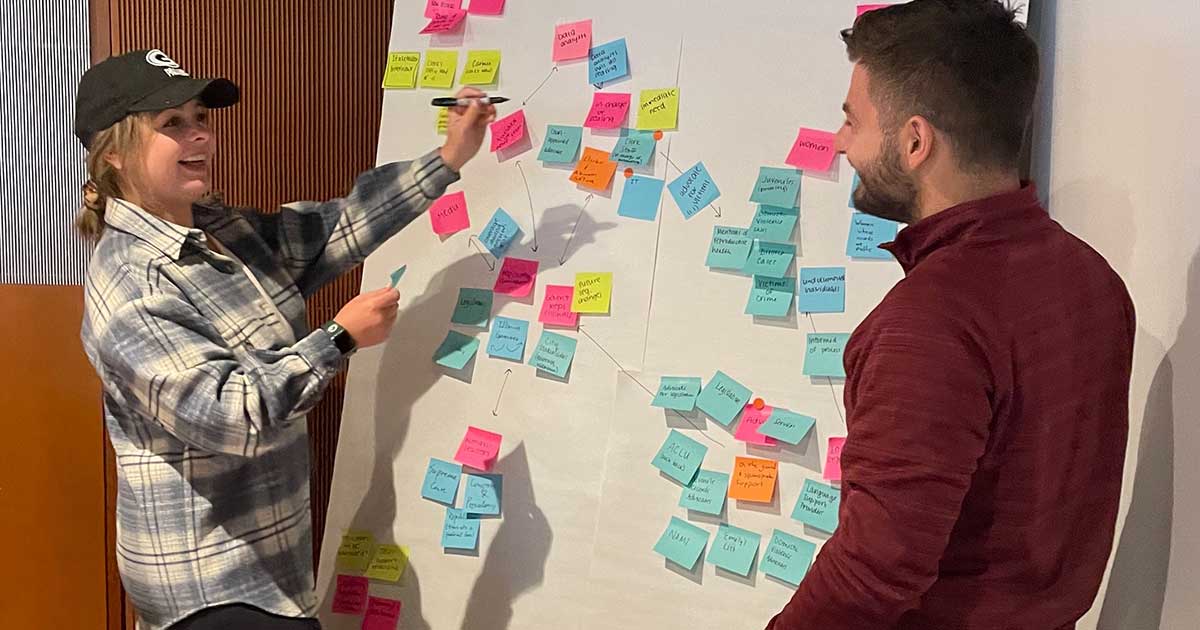Protecting Women’s Health Privacy
Students in the MMM program’s Equity Centered Design class partnered with a Chicago group to help seal recently-digitized sensitive information.

A group of Northwestern University students is helping remove women’s sensitive reproductive health information from the internet.
The students were part of Equity Centered Design in Northwestern's MMM program, a dual-degree program between Northwestern Engineering and the Kellogg School of Management. They partnered with Chicago 77 Group (C77), an organization that partners to implement research, program development, and innovative strategies.
The problem the students were tasked with solving started with a well-intentioned effort to digitize antiquated court filing systems in Illinois. The goal was to improve transparency and efficiency while sparking reform in the civil and criminal justice systems.
However, the millions of court records converted from paper to digital files contained a volume of documents in which women’s reproductive health matters were discussed in detail. These cases centered on domestic violence incidents, divorces, and criminal cases. They discussed sensitive issues such as abortion, miscarriage, and fertility treatments.
The MMM students were given a two-part challenge:
- Identify the various stakeholders who C77 and their government partners can engage to support the initiative.
- Identify technology that could be helpful for the team as it works to get the digital files sealed.
The scope and urgency of the problem the students were tasked with solving was immense and immediate. Because the number of records that need to be examined runs into the millions and the sensitive nature of the information those records contains, C77 wanted a quick and effective answer.
“The partnership was ideal because I knew that I could learn from the students and hopefully provide them with a project that they can be proud to have worked on,” said Katie Dunne, executive director for C77. “Their research, insight, and questions helped identify some of the areas that we needed to focus our efforts on.”
Equity centered design is an expansion of human-centered design that ensures people who are often missed or negatively impacted by the design of a product or service have their voices heard.
“Without intentional changes to the process of who is at the table when we design and how we engage, we are likely to design solutions that center on groups that have the loudest voice in society,” said Allie Newell, a student who worked on the project with C77. “Taking an equity centered design approach is a more thoughtful and impactful way to design a future that embraces the diversity of peoples’ lived experiences and perspectives.”
Newell said it could have been easy to come up with large-scale ideas with an array of complicated components, but that wouldn't help C77 with its current challenge.
"I learned that understanding the complexities and nuances of the current state is critical to inform the solution," Newell said. "Being realistic about the limitations of certain processes enabled our team to focus on practical ideas and innovations. As our professors say, creativity needs guardrails."
For their final presentation, the students proposed a stakeholder map, communication initiative ideas, requirements, and questions to consider when evaluating technology, and a high-level innovation scan of available technology.
"Our goal was to create a starting point and tools for the Chicago77 team to run with as they get more information," Newell said. "These deliverables are meant to evolve."
Dunne said the students provided the research and framework necessary for C77 to move forward on both tasks and that their technology recommendations are currently being evaluated.
"Their final presentation brilliantly encapsulated both of their objectives and the discussions that we had regarding the scope of the project," Dunne said. "Their research and human-centered design highlighted their deep understanding and compassion for the women that we intend to serve."
